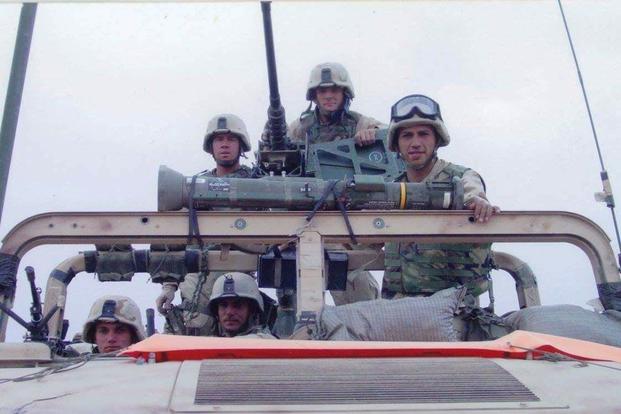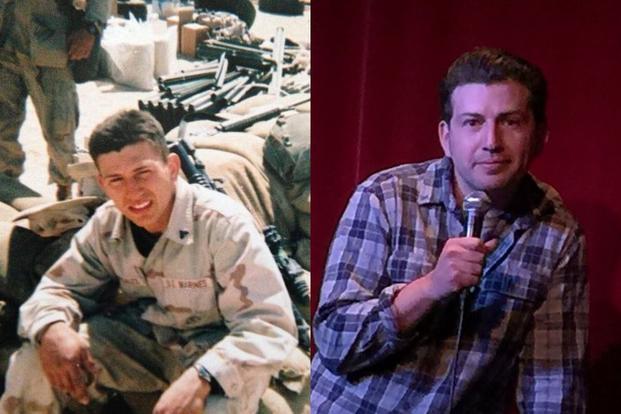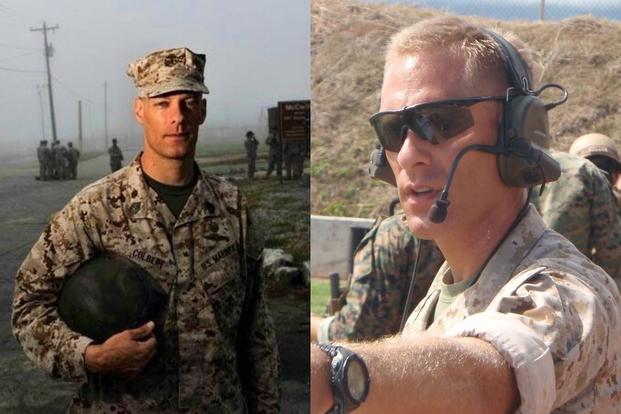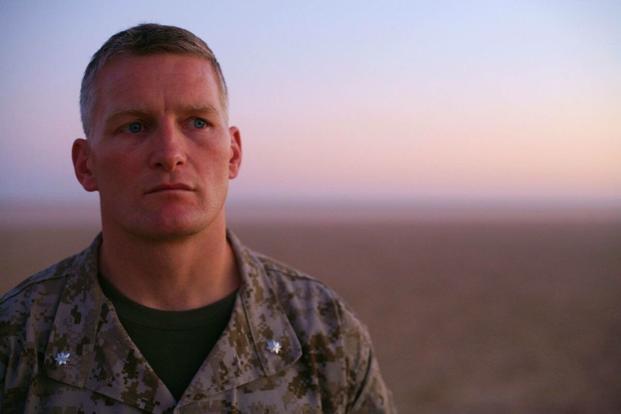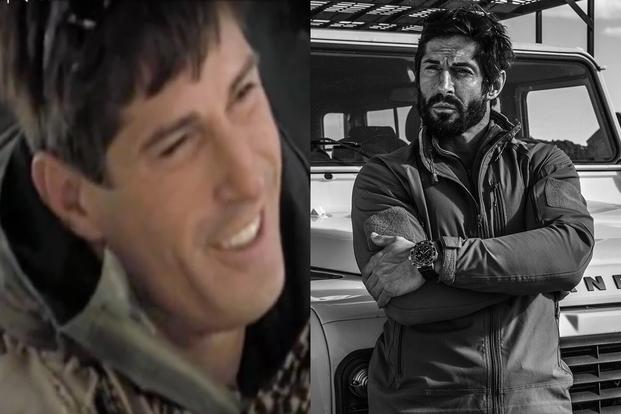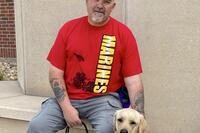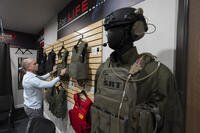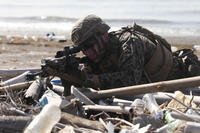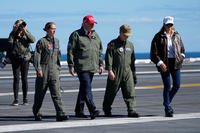For many Americans, civilian and military, the most intimate look at the 2003 invasion of Iraq comes through the eyes of a company of wry reconnaissance Marines who trade insults and belt Avril Lavigne songs to ward off sleeplessness and boredom as they plunge deep into an unknown combat zone as shock troops in thinly protected Humvees.
As captured by Rolling Stone reporter Evan Wright in a series of articles that would later spawn a book, "Generation Kill," and an HBO miniseries of the same name, the Marines of Bravo Company, 1st Reconnaissance Battalion, find themselves at the front lines of the invasion, improvising ways to fight in unfamiliar terrain and navigating the moral quandaries of combat, under the leadership of junior officers they don't always understand or trust and enlisted leaders seemingly fixated on enforcing the ubiquitous Marine Corps "grooming standard."
Bubbling below the surface is a fundamental difference of perspective between the elite and irreverent Recon Marines and a larger Marine Corps with an allergy to exceptionalism and a need for all Marines to toe a strict line.
And at the helm of the entire assault is a familiar figure: Maj. Gen. James Mattis, who called the men of 1st Recon "cocky, obnoxious bastards" and sent them to the front, saying he prized their courage over the armor and gear of better-equipped units. Mattis, now a retired four-star general and the former commander of U.S. Central Command, was nominated this month to become secretary of defense.
Thanks to the runaway popularity of "Generation Kill," the Marines got something else they hadn't bargained for -- a measure of celebrity and recognition that continues to follow them, to varying extents, a decade later. Some have traded on their fame, while others have just tried to move on. But the Marines of Bravo Company who spoke with Military.com said they remain glad that their story was told, and proud of their service in what would be a long and costly war.
Thrust into the Spotlight
If a single protagonist emerges in "Generation Kill," it's Sgt. Brad Colbert, a wry, intellectual 28-year-old team leader whose coolness under pressure earns him the nickname "Iceman."
While most of the enlisted Marines in Bravo Company who make appearances in the book and show left the Marine Corps shortly after their deployment, Colbert chose to make a career of the Corps, retiring Oct. 24 as a master sergeant with 20 years of service.

When he spoke with Military.com in July, Colbert, 42, was still on active duty as a project officer for Raids and Amphibious Reconnaissance at Marine Corps Systems Command, the branch of the service responsible for developing and acquiring new gear and equipment.
For Colbert, the attention that came with his inadvertent starring role was a mixed blessing; for Marines looking for a long-term future in the Corps, conventional wisdom says to "keep off the skyline" or out of the public eye -- particularly as part of a group of foul-mouthed Marines holding forth with complete candor on subjects ranging from their unit leadership to the state of race and class in America.
As the articles came out and began to receive attention from the Marine Corps, Colbert said he was called in to several meetings with service leaders, including Mattis himself, to account for the portrayal. He assured the leaders that the conversations were not a sign of dissension in the ranks, but rather a "ground-eye view of warfare."
"I don't tell my Marines in the heat of battle what to say and what to think," he said. "What I ask my Marines to do is execute commander's intent. And I like to think my Marines did what was asked of them and more."
On a personal level, Colbert said his feelings about "Generation Kill" evolved over time.
"It's like listening to yourself on the answering machine; you sound like an idiot," he said of seeing his conversations and remarks reproduced. "I was excited, because I wanted to be able to share my experiences with the world, and I had a vehicle to do that. But at the same time I would cringe. So many of the things I said, having them thrown back in my face was embarrassing."
He did lose some friends, and said he experienced some ostracism within the close-knit reconnaissance community as a result of the unvarnished account. While some officers, such as 1st Lt. Nathaniel Fick, a platoon commander, were generally well-regarded by the junior Marines and noncommissioned officers, others were sometimes regarded as incompetent or unable to handle the stress of combat, and given unflattering nicknames such as "Encino Man" and "Captain America."
"At the end of the day, it was real events," Colbert said he ultimately concluded. "No matter how gritty or politically incorrect, it was real life."
Colbert's vehicle driver and counterpart is Cpl. Josh Ray Person, a whip-smart 22-year-old with a quick response to everything and a penchant for energy drinks and caffeine. Today, he's a 36-year-old father of three who is part of a software development start-up in Kansas city.
Person, who left the Marine Corps in 2003, shortly after returning from his deployment to Iraq, said "Generation Kill" gave him a rare gift: the opportunity to share his deployment experiences in the most realistic way possible with his wife, whom he married in 2007. They attended the 2007 premiere of the show in Burbank, California, together, and it brought them closer, Person said.

For her to be able to see it on the screen and have it so accurately portrayed just visually, I loved that," Person said. " 'See that, that's exactly what it was like.' That was what I enjoyed the most out of the entire thing."
The miniseries, which has remained popular with Marines in part because of its realism, was accurate at rates of "60 to 70 percent," Person estimated, though the elements he singles out as not true-to-life have little to do with major events in the deployment. The personalities of the Marines were a bit exaggerated for the screen, and he complains, tongue-in-cheek, that the actor who played him onscreen, James Ransone, was a lot more petite than he is.
"They found a guy who's like, 'Hey, you're 120 pounds soaking wet, perfect,' " he said. In the next breath, though, he admitted he and Ransone had very similar personalities and that the actor portrayed him pretty well.
"Generation Kill" has opened some doors for Person in his business ventures, making people who recognize his name more willing to hear him out. And he still occasionally has fans find him on social media, he said. But the value of the series goes far beyond that for him. And he's grateful for it, in part because of the clear-eyed way it approaches the imperfections and ugliness of war.
"It was raw and real; it showed the confusion. It showed incorrect decisions in hindsight," Person said. "That's life. It showed it in a very raw way from a perspective that wasn't from the top down, it was from the bottom up. It gave voice to the low-level guys who never had a voice before."
Scenes that depict a small child inadvertently shot at a military roadblock, an airstrike that decimates a compound full of Iraqi civilians, and Marines trying to conduct crude crowd control with smoke grenades show realities that haunt warfighters -- realities that the public, for the most part, has the luxury of ignoring.
"War is stupid. War is ugly. War is confusion. War is death," Person said. "[Generation Kill] shows that 19- and 20-year-olds are prosecuting this war, for the most part. Here they are, having to navigate geopolitics combined with group psychology and all these things. Yeah, they're going to bumble. Even barring all of that, what we're capable of and what humans are capable of is phenomenal. I think people are used to seeing the reality of things. They have never really gotten that from war journalism."
Life After Generation Kill
A significant number of the the Marines from Bravo Company were brought in at some point to consult on the "Generation Kill" miniseries, a fact that unquestionably contributed to its realism and accuracy.
But no one was more involved than Rudy Reyes, a sergeant and team leader who agreed to play himself in the show -- a surreal experience, he says, in which he said lines as himself that he'd never really say.

Reyes, 44, has made better use of the publicity that came with "Generation Kill" than perhaps anyone else involved with the project. For him, it's been a springboard into a fitness modeling and acting career and a host of other military-related projects. He's a spokesman for Condition One and has modeled for brands including Pentax Camera. But he won't let anyone forget that he's a Marine first.
Reyes was never your stereotypical grunt. The members of his unit called him "Fruity Rudy" because he was "so beautiful," journalist Evan Wright wrote, though he insists he's no more appealing than any of the "young gods" he went to war with. Reyes comes across as a mixture of Bruce Lee and zen master on screen, and he has a meditative way of speaking that can contrast startlingly with his frank discussion of war.
Reyes, who still makes public appearances based on his "Generation Kill" fame, said he noticed the series had made a resurgence among troops and the general public as the country finds itself once again at war in Iraq, trying to eliminate Islamic State militants from the air and in an advisory capacity on the ground.
"When [the series] came out, it was too close and too timely. We were not interested in veterans' issues at that time; we were not interested in anything except forgetting," he said. "Now America is finally waking up."
Like many of the Marines portrayed in the show, Reyes makes no attempt to gloss over the pain and the moral conflict he still grapples with, more than a decade after the invasion.
"There is a gravity, there is a sadness, there is a rage that you carry with you forever," he said. "I was hoping, when I did this work for HBO, that we could find a way to peer into that world. I think it was a start to open a dialogue for all of us, and open up a dialogue amongst ourselves in the military communities. I still work on it. I still have problems inside."
As far as Reyes is concerned, he owes no debt to the show for the exposure it afforded him.
"I couldn't have done it without 'Generation Kill,' " he acknowledged. "But then again, 'Generation Kill' wouldn't have existed without me invading a country. Nobody gave anybody a hookup."
"Generation Kill" also springboarded the career of at least one of the professional actors: Chance Kelly, who played the raspy-voiced Lt. Col. Stephen "Godfather" Ferrando, the commander of 1st Reconnaissance Battalion. Ferrando is portrayed as tough, unrelenting and ambitious, and consumingly eager to stay in the good graces of Gen. Mattis, to ensure his Marines stay on the front edge of the fight.

The show often appears to take the side of the junior enlisted Marines with whom Wright spent most of his time, and Ferrando, like many of the officers, is shown as flawed.
Both the book and the show end with a frank discussion between Ferrando and Wright in which the reporter asks him about his seeming over-aggressiveness to send Marines into the fray, and his decision to keep an officer in his command who seemed to have become erratic and violent in the face of combat. In the end, Wright concludes Ferrando was "vindicated," as Mattis' choice of unit to prosecute the fight.
Kelly said he knew he had to get in touch with Ferrando himself when he landed the role, and the two men quickly developed a friendly relationship, he said. It was especially difficult, he said, to play Ferrando as a conflicted character on the show after he had developed so much respect for the officer personally.
"These guys were officers in 1st Recon, USMC. You do not get there by being a bumbling idiot," Kelly said. "They went over there and they did not have one death. They did not paint things [subtly] in that black-and-white TV world. Ferrando gets an A-plus, I don't give a s--- what anybody says. "
Kelly's exposure in the show led to a host of new acting opportunities -- he has since had roles in hit shows including "Fringe," "House of Cards," "Homeland" and "Army Wives," as well as a role as a military officer in the Bradley Cooper blockbuster "American Sniper" -- but it has also given him rare access to military culture through the show's fanbase. He laughs as he describes walking through Prague with his wife five years ago and getting stopped by four Marines on leave who immediately started calling him "Godfather."
"Everybody identifies with this, especially in the military. This is the Bible to the Marines," he said. "There's no other show that profiles Marine Corps life like this to date."
Moving On
There are some who have done their best to move past the fame and infamy of "Generation Kill." For Jeffrey Carisalez, a lance corporal and vehicle mechanic for Bravo Company, the deployment ended on a bitter note with the relief of team leader and friend Sgt. Eric Kocher, after another unit reported he and other Marines had been mistreating an Iraqi prisoner, a point hotly disputed by the unit.

Carisalez, a salty-mouthed Marine who freely criticizes the Marine Corps and the war throughout the deployment, was informed after his return that he too could face administrative punishment for his comments. At that point, he knew for sure he wanted out of the Corps.
"I popped smoke quick," he said. "I was on base like, two weeks at most."
Now he's an envelope-pushing stand-up comedian in Los Angeles who performs five to seven nights a week, he said. Now 34, Carisalez' Marine Corps service was the better part of a lifetime ago. He's not an enthusiastic fan of "Generation Kill," but he said it accurately captured "how foul-mouthed and dirty we were."
It also provided a moment of vindication for Kocher, who called Carisalez when the Rolling Stone feature came out to tell him, "Dude, we won!"
Like many, Carisalez hopes the story paints a clearer picture of war's realities for those who never served.
"Civilians can have attention deficit disorder," he said. "['Generation Kill'] maybe exposes the trials, tribulations and struggles of these guys that go up and stand for something bigger than themselves. Whether than the war was right or wrong, these guys stood up for something bigger than themselves."
On the other side of the spectrum is Walt Hasser, a good-natured Humvee MK-19 grenade launcher gunner who spent three more years in the Marine Corps following the 2003 deployment, leaving the service as a sergeant.
Now 36, Hasser works as a marksmanship trainer and a security consultant in Virginia. He has pointedly tried not to capitalize on the measure of fame afforded by his involvement in "Generation Kill," but said his name still gets recognized regularly by people he encounters through his work, and one of his co-workers insists on calling him "Hollywood Hasser."
Hasser's reservations about the series come not from any concerns about how he was personally portrayed, but more from a reticence about the publicity it afforded the traditionally secretive Marine reconnaissance community.
"As a recon Marine, we exposed our soft underbellies a little bit," he said.
Yet, over time, he like many others has concluded the story has significance that goes beyond one unit and their experiences.
"If it was in my power to pull that story back, I wouldn't do that," he said. "It's a hell of a time in our history. It's definitely important."
No Regrets
After the initial shock of "Generation Kill," most Marines embraced the narrative and its author, Evan Wright. In 2005, he would receive the General Wallace M. Greene Jr. award from the Marine Corps Heritage Foundation for best non-fiction account depicting Marines and Marine Corps life.
There were exceptions: Wright said he found himself briefly handcuffed and escorted out by military police at Camp Pendleton, California, in 2004 after one of the junior officers he had described unfavorably learned he was aboard the base.
Wright said he worked to involve as many Marines as possible in the production of the show, with roughly a dozen participating in roles ranging from consulting to background voice work. He said he's witnessed up close the Marines' struggles with post-traumatic stress and "darkness" since returning from Iraq. At least one man from Bravo company has contended with serious mental illness since the deployment, and several have had grave brushes with the law. In one case, Wright testified as an expert witness in the defense of a Marine he met in Iraq who was later arrested for homicide.
While some may come away from the book and the series conflicted about the realities of war and the collateral damage sustained, Wright maintains the men he traveled with have never received enough credit for the disciplined war they prosecuted in a complex and unfamiliar environment.
"It's so much easier to write about a firefight, where shootings happened," he said. "The thing that I witnessed in 'Generation Kill' that's so hard to dramatize is the many times that people took fire and did not shoot back because they didn't have a legitimate target. Moral courage and restraint; it was on the backs of [sergeants] and below that our military succeeded."
While many of the Marines have stayed in touch in the years since the invasion, Colbert and Wright both cited the warm friendship that has grown between them through "Generation Kill."
For Colbert, his confidence in the project was bolstered when Wright approached him to ask his blessing to turn the three-article Rolling Stone series into a book. Despite the heat Colbert initially took because of "Generation Kill," he said he has no regrets that the story was told.
"I've spoken to sailors and soldiers and Marines and airmen. Almost to the man or woman, the 'Generation Kill' book and following show seemed to resonate so strongly," he said. "It didn't matter that it was a Marine unit that was being portrayed. To not have that story told would disenfranchise the experience of the U.S. military for the last 15 years. It is that everyman and every woman story; to be able to have that narrative is invaluable."
-- Hope Hodge Seck can be reached at hope.seck@military.com. Follow her on Twitter at @HopeSeck.
